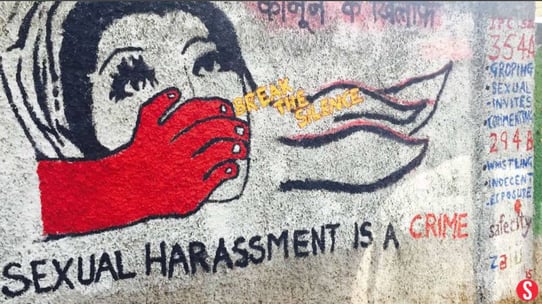For years, ElsaMarie D’Silva kept the incident a secret. She was travelling with her mother and siblings on a crowded train in Mumbai when she felt a stranger grope her pelvic area.
Yet the girl, just 13 years of age at the time, had no way of getting help. She couldn’t scream amid the cacophony of sounds in the train compartment. She couldn’t even raise her arms to bat the man away, since they were pressed down against a sea of fellow travelers.
The assault put an indelible scar on D’Silva. In the years that followed, she’d avoid city trains whenever possible, opting for more time-consuming routes to reach her destination.
And yet, like many victims of sexual assault, she didn’t feel comfortable telling anyone. “I filed it at the back of my mind and moved on with life in the best way I knew how to,” she explained during a 2015 Ted Talk.

That is, until a particularly horrifying event shook the country of India ‒ and the rest of the globe ‒ in 2012. It was then that a 23-year-old physical therapy student from Delhi, accompanied by a male friend, was so brutally raped by a group of young assailants that she later died from her injuries.
By then a 20-year veteran of the aviation industry, D’Silva knew she couldn’t remain quiet about her own story any longer. She decided to use the very tool that helped her coordinate 500 flights each day as an airline executive to help combat the problem of sexual assault in India: data.
Her solution was an app called Safecity, which allows women and young girls to report incidents of everything from rape to indecent exposure and unwanted picture-taking. It also provided a comments section where females can share their stories of violence and provide mutual support.
The data, she says, can help law enforcement officials and community leaders to focus on “hotspots” where this type of behavior seems to emanate. And, crucially, it also helps hold law enforcement accountable if those problem areas aren’t addressed. “My challenge with SafeCity is to actually get people to question the status quo,” D’Silva told her Ted Talk audience.
D’Silva has already garnered numerous plaudits for her venture, including the 2016 Gold Stevie Award for Female Entrepreneur of the Year. More importantly, the company she founded is making a big impact throughout some of India’s most populated cities.
The 2017 Stevie Awards for Women in Business, the top awards for women entrepreneurs, executives, and employees around the world, opens for entries on May 22. Request the entry kit here.
In Mumbai, for example, local police have altered their patrols to counteract hotspots. And in Delhi, city leaders have increased the availability of public restrooms, alleviating the opportunity for predators to abuse women who otherwise had no choice but to relieve themselves outdoors.
The technology is also making it possible to confront problems in more novel ways. For instance, crowdsourced data revealed a tea stall in Delhi where men would loiter and stare in an intimidating fashion at girls as they passed by.
Once that trend became known, a community group hired a local artist to paint a mural outside the tea stand featuring eyes that glare back at the male customers. It has a sign that, in translation, reads “Look with your heart and not with your eyes.” As a result, D’Silva says, the menacing behavior has been significantly reduced.
Because of stories like the horrific incident in 2012, India has developed an outsized reputation for sexual violence. But D’Silva says it’s important to realize that there’s actually a much wider phenomenon that needs to be addressed globally. She uses a startling statistic from UN Women to make her point: 1 in 3 females, the organization finds, will encounter some type of sexual assault in their lifetime.
Indeed, the market for Safecity has grown beyond India’s borders to countries like Kenya, Cameroon and Nepal. The company is even getting reports from western cities like New York and London. In total, it’s gathered information on more than 10,000 incidents of sexual assault and intimidation.
The more the tool spreads, the closer D’Silva believes cities will get to achieving true gender equality. “We need to create a world where every girl can walk down the street without fear of being intimidated and where every woman has an equal opportunity to a quality life,” she said.












